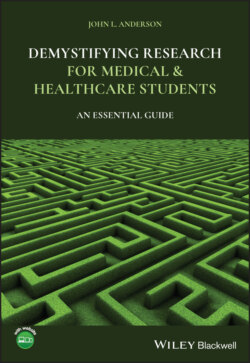Читать книгу Demystifying Research for Medical and Healthcare Students - John L. Anderson - Страница 24
Ontology
ОглавлениеOntology is the study of ‘being’ and what constitutes ‘reality’. Now this is complex, so don't even go to Wikipedia and hope to find a simple version. There is none. The main philosophical debate is about whether there is one absolute reality or whether there are multiple realities. I have struggled with this for years and still do. I have reached these conclusions:
In some cases, there is only one reality. If someone points a gun at me and threatens to pull the trigger, I am not going to get into a discussion about how he defines a gun. I am not going to argue that his faith in his gun is determined by a questionable philosophical stance and … BANG! I have lost the argument. He has proved his point. So, for a lot of things − for example, the ‘realities’ of the physical world – I am not going to question most of it. I believe in bricks and walls and roofs etc. I depend on these every day to live in. And whilst I might debate the qualities of bricks and walls and roofs with you, at the end of the day we would probably agree that they are there and that we can reach out and touch them. They are hard, and if one falls on your foot it will hurt. Facts. We share a common physical universe which we can live in and experience and we can check that out with other people. You could say that they were objective in that they exist whether we believe in them or not.
But in some things, there is more than one interpretation of reality. And there are some things which are more negotiable in terms of their ‘reality’. People's thoughts, feelings, senses, and experiences are definitely subjective. These belong to the individual who owns them and, although we can find out what they are, we may never be able (at least, at this point in our ‘scientific’ development) to fully understand the other's experiencing of life. Furthermore, our ability to understand – to get as near as possible to ‘knowing’ – the experiences of others, will be determined by our own situation in the social world.
One of the examples that I have used in teaching this, is that of pain. If you look up ‘measuring pain’ in Wikipedia (not my favourite source, but an interesting one), you will find the following story:
In 1940, James D. Hardy, Harold G. Wolff and Helen Goodell of Cornell University introduced the first dolorimeter as a method for evaluating the effectiveness of analgesic medications. They did their work at New York Hospital. They focused the light of a 100 watt projection lamp with a lens on an area of skin that had been blackened to minimize reflection. They found that most people expressed a pain sensation when the skin temperature reached 113°F (45°C). They also found that after the skin temperature reached 152°F (67°C), the pain sensations did not intensify even if the heat were increased. They developed a pain scale, called the ‘Hardy–Wolff‐Goodell’ scale, with 10 gradations, or 10 levels. They assigned the name of ‘dols’ to these levels. Other researchers were not able to reproduce the results of Hardy, Wolff and Goodell, and the device and the approach were abandoned … In 1945, Time magazine reported that Cleveland's Dr. Lorand Julius Bela Gluzek had developed a dolorimeter that measured pain in grams. Dr. Gluzek claimed that his dolorimeter was 97% accurate.
Sounds a bit far‐fetched to me! Some of the approaches to develop ‘pain‐ometers’ were bizarre and reminded me of the experiments in Nazi Germany (I deal with these in Chapter 18).
In the 1970s, pain was initially ‘measured’ as ‘mild, moderate or severe’. Then people began to tinker with it to make it more sophisticated. They introduced 10‐point scales, some of which are accompanied by faces smiling to crying. (See Figure 1.1.)
FIGURE 1.1 The 10‐point pain scale (Harvard Men’s Health Watch, 2018).
Source: Image: © EgudinKa/Getty Images.
Can you imagine, one patient says to another:
P1:
How're you feeling today?
P2:
Not great – I've got a grade 8 pain!
P1:
Gee, I'm sorry to hear that! What axis are you measuring it on?
Those who believe that there is only one reality and that this reality exists independently of our knowledge of it are called positivists. Those who believe that all reality is subjective are called relativists or interpretivists. To me it does not make sense to say, ‘I believe that all of “reality” is subjective’, any more that it makes sense to me to say ‘I believe that all of reality is objective’. But, I acknowledge that other people have different views. For me, life is too short to bother with them. And that's all I want to say about that.
